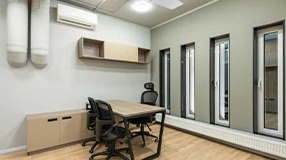Air conditioning (AC) is like the very luxury as far as comfort is concerned, and the scorching summers in Pakistan are no different. However, here is a question most homeowners fail to consider: Do we need to ventilate an AC room?
The majority of the population thinks that as long as the AC is switched on, it does not really matter whether the air is ventilated or not. And alas, that is a great fallacy. Lacking air conditioning, your air-conditioned area may turn into a nest of pollutants and humidity and bad air. In this article, we shall disaggregate the five myths regarding ventilation when using an AC room, and uncover what you actually may need to know in order to feel comfortable and healthy inside.
Myth 1: Air Conditions supply Fresh Air
A misconception that most people have about an air conditioner is that it introduces outside air.
That's completely false.
Your AC does not provide the air that enters your room; it only recycles what is already in your room. Although it cools down and cleanses the air, to some degree, it does not substitute it with new oxygen. Eventually, this confined air is gradually deprived of oxygen and collects carbon dioxide and bacteria, and smells - particularly when your room is closed all day.
Reality Check:
You still must have a certain type of ventilation even when in a full air-conditioned room - an exhaust fan, an outside inhaled of fresh air, and sometimes, you need to open your windows. Learn how ventilating homes without AC systems keeps air fresh and healthy in our detailed article: Do Houses with No AC Systems Need Ventilation?
Myth 2: Ventilation is an Energy Waster
Most house owners fear that opening a window or ventilation will cause their air conditioner to be overloaded, and the electricity bill is going to be high.
This is partly the case when ventilation is performed improperly. It has to do with the crucial factor of balanced ventilation, which is sufficient to permit the stale air out of the room and the fresh air in, without causing overstrain to your AC system. Indicatively, heat recovery ventilators (HRVs) and energy recovery ventilators (ERVs) are meant to introduce fresh air with a minimum amount of energy wastage.
Reality Check:
Ventilation is, in fact, beneficial to your AC in the long term. It stops the overflow of humidity and lessens the mould growth - keeping your interior air cleaner and your system more effective.
Alternatively, one can encounter the Building Construction Services (also read: Building Construction Services - Trusted Experts in Pakistan): a company offering construction services in Pakistan to keep in mind. To understand how professionals make homes energy-efficient (how to make homes energy-efficient). Discover how proper AC-ventilation strategies ensure your indoor air is both cool and clean: AC Ventilation — The Secret to Fresh, Cool and Healthy Indoor Air.
Myth 3: Modern Homes do not require ventilation
The sealed, energy-efficient construction is present today, which is why most citizens do not think that additional ventilation is necessary. However, this is the issue here: modern houses are over-sealed.
Although this is useful in saving energy, it also traps pollutants like:
- Paint and furniture Volatile Organic compounds (VOCs).
- Dust and allergens
- Carbon dioxide buildup
- Cooking and shower moisture.
These pollutants spread in your AC without ventilation, hence a poor quality of indoor air, which results in allergies, fatigue, and even breathing difficulties.
Reality Check:
Up-to-date houses require mechanical ventilation as never before. The right design system will make sure that your AC room does not become a stuffy box with stale air.
Myth 4: The Only Buildings that Ventilate are Large Buildings
It may be easy to imagine that all that may require a proper ventilation system are offices, factories or even commercial buildings. But that's another big myth.
Ventilation is essential in keeping the living conditions comfortable and the air quality in small apartments or single rooms. There will be no ventilation, and the humidity increases, and you may be able to see wet walls, mold or a bad smell- all this is a sign that the air of your room is not circulating correctly.
Reality Check:
It can be your house, your workplace, or your store, but any area that is enclosed requires some form of air circulation. Window vents, exhaust fans, and cross-ventilation designs would be of immense help in small AC rooms.
Myth 5: Ventilation lowers the efficiency of cooling
This is half true of this one, however, but it all depends on how you ventilate. When you leave your windows open all day, running your AC, surely the cool air is going to run out. However, it can be embraced to increase the level of comfort when the ventilation is planned well, such as working with controlled vents, smart fans, or the use of periodic fresh-air cycles.
Reality Check:
By having fresh air in your AC room now and then, the system does not have to work extra hard to eliminate the trapped heat or moisture. The result?
- Better cooling efficiency
- Cleaner indoor air
- Reduced maintenance issues
The reasons why Ventilation and AC should go hand in hand
Rather than regard ventilation and AC as opposites, consider them as a couple. Your AC is dehumidifying, cooling, and ventilating, making the air clean and rich in oxygen.
With both systems operating in conjunction with each other, you will have:
- Temperature regulation inside the house.
- Reduced health risks
- Reduced power use in the long run.
- Fresh and comfortable atmosphere.
Good ventilation will make your air conditioner work at its optimum, whether it be by use of mechanical ventilators, exhaust fans, or smart air systems. Explore how solar panel installations can help reduce your energy costs and improve comfort: Solar Panel Services – Trusted Installation Experts in Pakistan.
Ventilation in Your AC Room: How to Improve It
The following are some of the practical methods of increasing ventilation in your air-conditioned room:
- Install Exhaust Fans: Primarily in kitchens and bathrooms to get rid of the damp, odorous air.
- Install Air Vents: Wall vents or window vents need to be installed in order to allow fresh air without reducing cooling.
- Attempt Cross Ventilation: Open two opposite windows momentarily after a few hours, provided that your room arrangement is such that it can do so.
- Install Air Purifiers: Air purifiers are not a replacement for ventilation, but can help to minimize dust and pollutants.
- Get Professional Assistance: An HVAC specialist would be able to advise on the best way to balance both cooling and ventilation to suit your house.
Summary: Comfort is Not Cool
Do we, therefore, require ventilation in an AC room? Absolutely yes. Fresh and healthy air cannot be provided by air conditioning only. A highly developed AC system may result in bad air quality, health complications, and discomfort even in the absence of ventilation.
Together with the smart ventilation and your AC system, you will have a healthier, cleaner and more energy-efficient interior environment, one that will not only support your well-being but will also truly help to improve it. For the best AC ventilation services in Pakistan, visit MistriHub.pk — your trusted platform for expert home maintenance and installation solutions.
Next time you turn on your air conditioner, you will remember: Cool air is desirable; it is fresh air that is necessary.
FAQs
Do there exist any air conditioners that ventilate?
No, air conditioners do not bring outside air; the air conditioner simply recirculates the indoor air.
What is the reason why ventilation is essential in AC rooms?
Ventilation assists in eliminating stagnant air, smell and impurities and aids in introducing new oxygen, which enhances the quality of indoor air.
Is there a reduction in AC cooling efficiency due to ventilation?
Not if done properly. Cooling can, in fact, be enhanced by controlled or timed ventilation and humidity reduced.
What do I do in order to ventilate an AC room?
Exhaust fans can be used, or air vents can be installed, or mechanical ventilation can be installed.



.jpg)
.jpg)
.jpg)